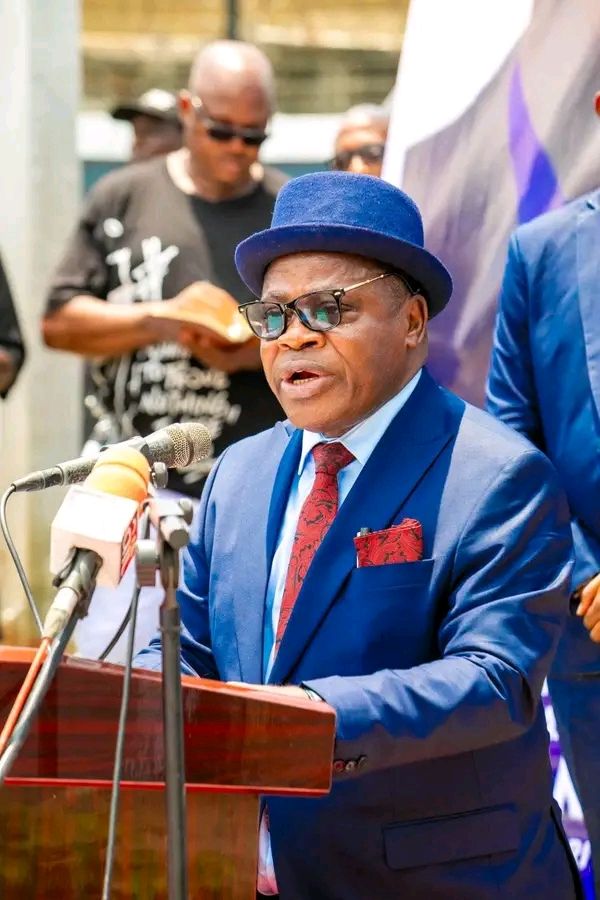Rivers Judiciary Fights Back as Chief Judge Convenes Late-Night Meeting
The political and legal landscape in Rivers State has taken a dramatic turn with the escalation of a constitutional crisis, pitting the state’s judiciary against a faction of the state’s legislature. The crisis began to unfold after the Martin Amaewhule-led faction of the Rivers State House of Assembly, through a plenary session, petitioned the Department of State Services (DSS) to investigate the state’s Chief Judge, alleging false age declaration. This move by the Assembly members has sparked alarm among legal circles and raised deep concerns about the increasing interference in judicial affairs by the legislative branch.
In a move that suggests an aggressive pushback against what is seen as a threat to judicial independence, the Chief Judge convened an emergency meeting of the state’s judicial council late at night to deliberate on how to safeguard the judiciary’s authority and preserve the principle of separation of powers enshrined in the Nigerian Constitution. The decision to hold such a late-night meeting underlines the gravity of the crisis and the urgency with which the judiciary is responding to the unfolding situation.
The allegations leveled against the Chief Judge have ignited a firestorm of legal and ethical debates. These allegations, specifically relating to false age declaration, have raised questions not only about the motivations of the Amaewhule-led faction but also about the legal grounds for such accusations, particularly given that these same legislators had previously screened and confirmed the Chief Judge during the administration of former Governor Nyesom Wike. The timing of the petition, along with the constitutional and procedural issues surrounding it, has only fueled suspicions of political maneuvering aimed at destabilizing the judiciary.
In response to these developments, a key judicial source, who spoke on condition of anonymity, revealed that during the meeting, the judiciary made a unanimous decision to establish an investigative panel to probe the alleged misconduct by the Amaewhule-led faction of the House of Assembly and certain local government chairmen who served under the Wike administration. This panel is set to examine allegations of cult-related activities, perjury, and other legal violations that some members of the Assembly have been implicated in. The outcome of this investigation could have far-reaching implications, both for the political establishment in Rivers State and the judiciary’s role in upholding the rule of law.
The judiciary’s bold stance has not gone unnoticed, and it appears to have sent shockwaves through the Rivers State House of Assembly, where reports suggest that some lawmakers—especially those who had recently returned from international trips—are making hurried plans to leave the country to avoid scrutiny. These actions indicate a growing sense of fear and uncertainty among the accused parties, highlighting just how serious the stakes are in this legal and political battle.
At the heart of the current crisis is the growing tension between the Rivers State legislature and the judiciary. The petition by the Amaewhule-led faction of the House of Assembly against the Chief Judge is seen as part of a broader attempt by certain political actors to exert influence over the judiciary. The judiciary, as an independent branch of government, plays a vital role in ensuring that the rule of law is maintained and that the actions of the executive and legislative branches are within the confines of the constitution.
The judiciary’s independence is a cornerstone of any democratic system, as it ensures that laws are applied impartially and without fear or favor. However, the Amaewhule-led faction’s call for an investigation into the Chief Judge’s age declaration has raised serious concerns about the possibility of political interference and attempts to undermine judicial autonomy. Such actions could set a dangerous precedent, as they may encourage further interference in judicial processes, eroding public confidence in the fairness and impartiality of the judiciary.
Moreover, the timing of the allegations is highly suspect. The Chief Judge, who had been confirmed by the legislature during the administration of former Governor Wike, is now facing scrutiny from the same legislative body that had initially approved her. This raises questions about whether the accusations are genuinely based on legal grounds or if they are being driven by political motivations aimed at weakening the judiciary. The fact that the Chief Judge was appointed and confirmed during Wike’s tenure further complicates the situation, with critics arguing that the Amaewhule-led faction may be using the false age declaration allegations as a means to undermine the judiciary and its influence in the state.
The decision to constitute an investigative panel marks a significant step in the judiciary’s attempt to assert its independence and resist external pressure. The panel’s mandate is to investigate allegations of misconduct by certain members of the Amaewhule-led House of Assembly and some local government chairmen who served under the Wike administration. These allegations, which include cult-related activities, perjury, and other breaches of the law, have raised serious concerns about the integrity of the legislative process in Rivers State.
If the panel proceeds with its inquiry, it could lead to major revelations regarding the conduct of some of the state’s most influential political figures. The prospect of such an investigation has reportedly caused anxiety within the ranks of the Amaewhule-led Assembly faction, with some lawmakers reportedly scrambling to avoid being implicated in the ongoing inquiry. The possibility of legal and political consequences for those involved in these alleged misconducts has only heightened tensions, with some individuals even considering fleeing the country to evade scrutiny.
The formation of the investigative panel also underscores the judiciary’s determination to take action and hold individuals accountable, regardless of their political standing. This move is likely to be seen as a test of the judiciary’s resolve to preserve the principle of the rule of law in the face of external pressures. The panel’s findings could have significant legal and political ramifications, potentially leading to criminal charges, political fallout, or even the dismissal of some lawmakers or officials from their posts.
The constitutional crisis unfolding in Rivers State also highlights the critical importance of the doctrine of separation of powers. This doctrine is designed to prevent any one branch of government from becoming too powerful and ensures that the judiciary, the executive, and the legislature remain distinct and independent from one another. In a system where the separation of powers is upheld, each branch of government acts as a check on the others, preventing any single entity from undermining democratic processes.
However, the ongoing tension between the judiciary and the Amaewhule-led faction of the Rivers State House of Assembly raises questions about whether the separation of powers is being respected in Rivers State. The move to petition the DSS to investigate the Chief Judge could be viewed as an attempt by the legislature to overstep its bounds and interfere with the judiciary’s independence. If successful, this could lead to a dangerous precedent, where the legislature can target and remove judicial officers for political reasons.
As the judiciary takes steps to investigate the allegations against the Amaewhule faction and other political figures, the wider question of the separation of powers remains at the forefront. The ability of the judiciary to operate without interference from the executive or legislature is crucial to the stability of Rivers State’s democratic institutions. Any attempt to undermine the judiciary’s independence could have serious consequences for the rule of law and the state’s democratic integrity.
The ongoing legal battle between the Rivers State judiciary and the legislature has far-reaching implications for the political and legal landscape of the state. If the judiciary successfully defends its independence and holds members of the Amaewhule-led faction accountable, it could set an important precedent for the protection of judicial autonomy in Nigeria. Conversely, if the legislature is able to undermine the judiciary’s authority, it could embolden other political actors to engage in similar efforts to control the judiciary, potentially leading to a breakdown in the rule of law.
The impact of the ongoing crisis will also be felt beyond Rivers State. Nigeria’s judiciary plays a vital role in maintaining the country’s legal and constitutional order, and any attempt to weaken its authority could send a worrying signal about the state of democracy and the rule of law in the country. The outcome of the ongoing battle in Rivers State will therefore be watched closely by political observers, legal experts, and citizens alike.
As the situation develops, all eyes will be on the judiciary to see how it handles the crisis and whether it can assert its independence in the face of mounting political pressure. The actions taken by the judiciary in the coming days and weeks could ultimately determine the future of the rule of law in Rivers State and serve as a bellwether for the broader political landscape in Nigeria.
The legal and political drama unfolding in Rivers State marks a critical moment in the ongoing struggle for judicial independence in Nigeria. The actions of the Amaewhule-led faction of the House of Assembly, as well as the judiciary’s response, will have long-lasting consequences for the state and the country as a whole. As the judiciary moves to constitute an investigative panel to probe the allegations of misconduct, the battle lines are being drawn. With the doctrine of separation of powers hanging in the balance, the people of Rivers State—and Nigeria as a whole—are waiting to see how this constitutional crisis will play out.






By this I think this Wike legislatures have started a wrong fight again, possibly that’s the one that will consume all of them before peace can return to River State